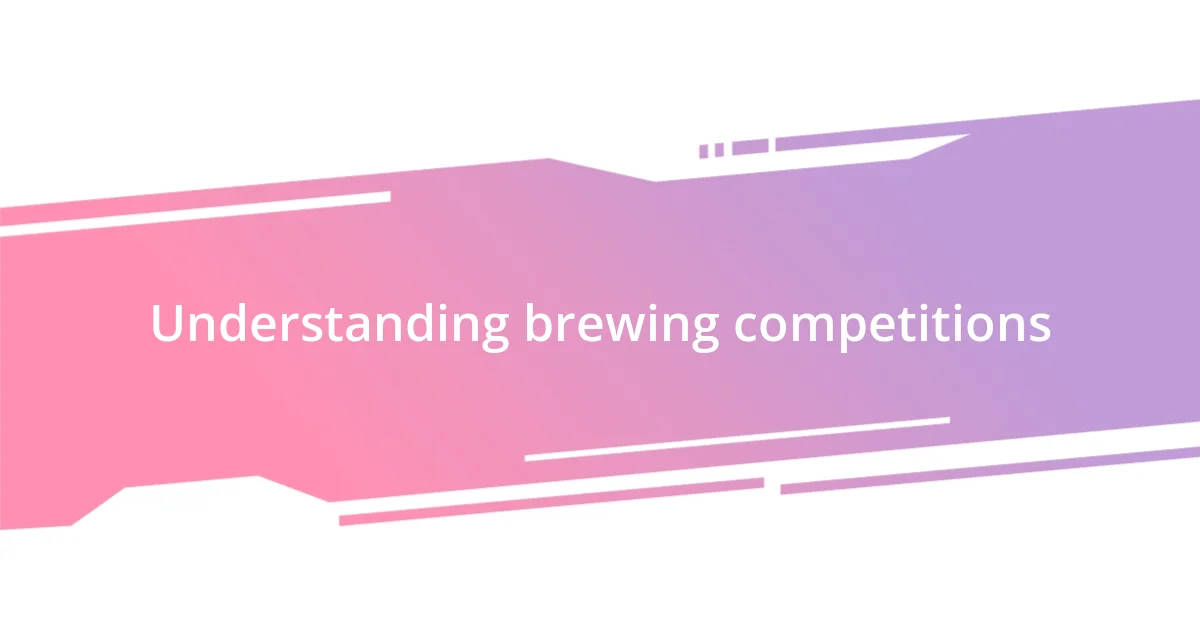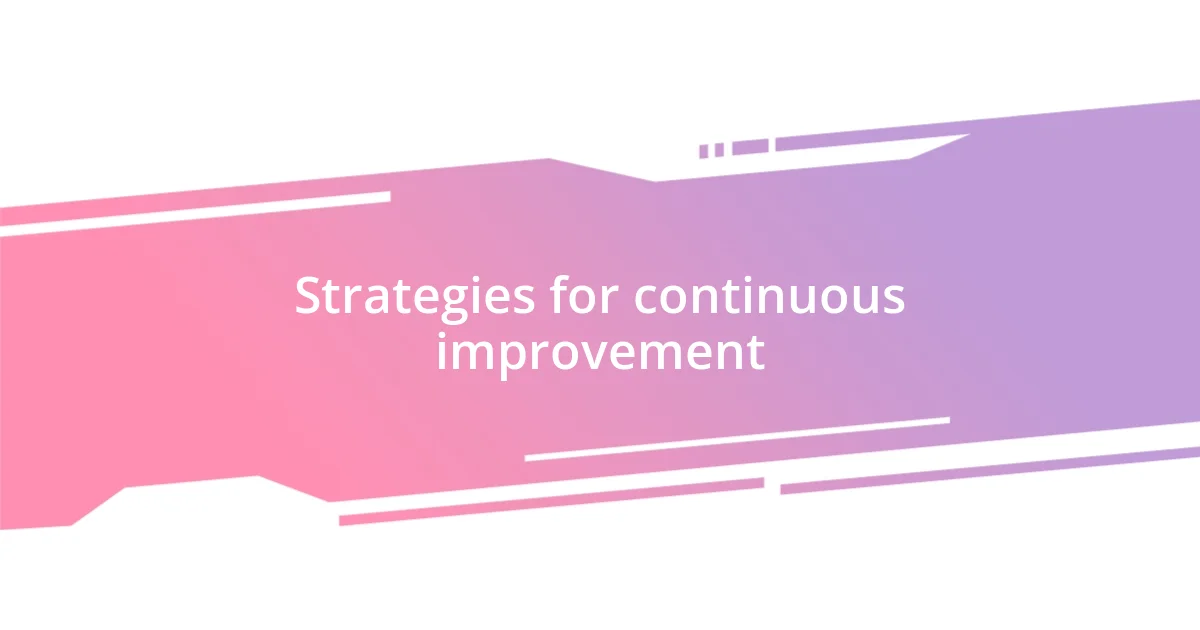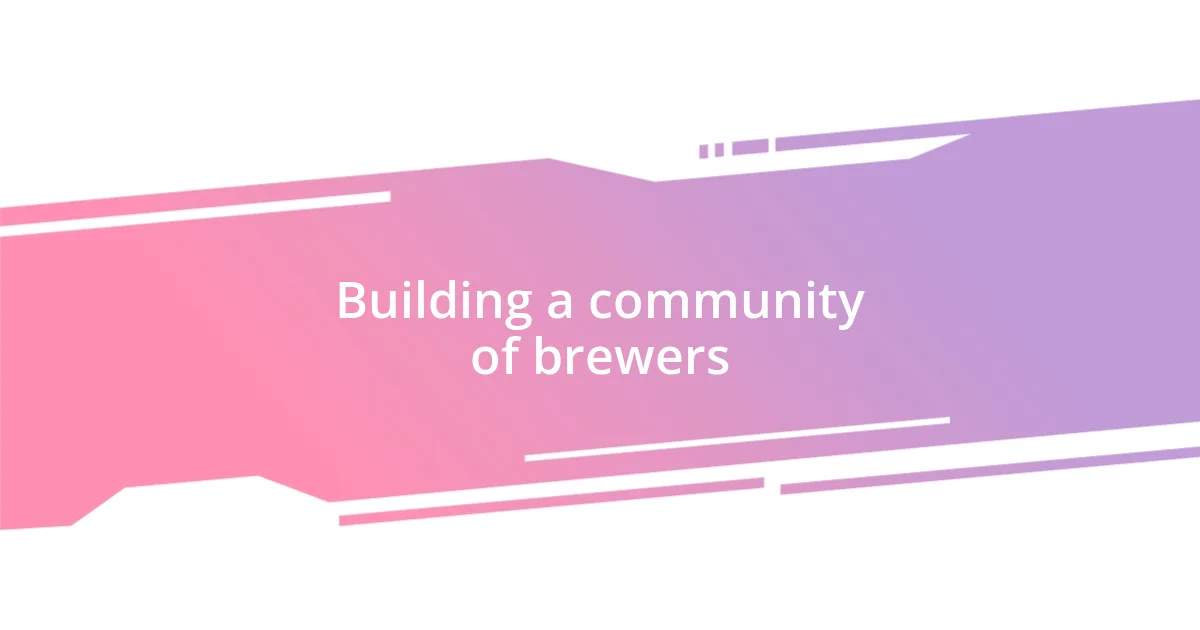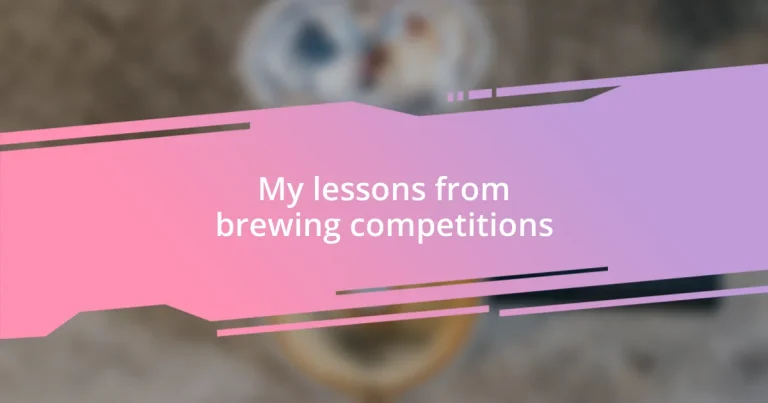Key takeaways:
- Brewing competitions serve as a platform for growth through constructive feedback and objective evaluation of brews.
- Key techniques for successful brewing include precision in measurements, temperature control, cleanliness, and patience in the brewing process.
- Building a supportive brewing community through collaboration, mentorship, and shared experiences enhances creativity and personal development.

Understanding brewing competitions
Brewing competitions are more than just a showcase of skills; they are a celebration of creativity and passion. I remember my first competition vividly—the anticipation in the air was palpable. Each participant brought something unique to the table, and I couldn’t help but wonder what made their brews tick.
Each competition is structured around a specific set of criteria, from flavor profiles to the appearance of the brew. I’ve often found myself reflecting on how these standards not only elevate the brewing process but also push us to refine our craft. Have you ever tasted beer that has left you questioning your own brew’s quality? That’s the kind of motivation that keeps brewers striving for excellence.
The judging process is particularly fascinating. It involves not just discerning good from bad but appreciating the nuances of each entry. I remember standing by the judging table, listening to the judges share their feedback. Their analysis was not just technical; it was a profound insight into the soul of each beer, which I found incredibly inspiring. How often do we get that level of critique in our daily brewing?

Lessons from judging experiences
The judging experiences I’ve had in brewing competitions have revealed the importance of objectivity and open-mindedness. I recall a moment when I judged a competition entry that didn’t initially appeal to me. But, as I took the time to analyze its complexity, I discovered layers of flavors that surprised me. It taught me that every brew has a story, and sometimes it’s worth digging deeper to appreciate it fully.
Another lesson learned was the power of communication. Observing how judges articulated their thoughts was eye-opening. I remember being part of a team where one judge posed questions that opened up discussions about the entries. That collaborative approach not only enriched our understanding but highlighted the importance of constructive feedback. After all, sharing perspectives can lead to a broader appreciation for the art of brewing.
Judging also underscored the significance of consistency in brewing. I once judged a beer that was excellent but varied greatly from batch to batch. I felt sympathy for its creator, understanding how frustrating it must be to imperfectly reproduce a brew. This experience solidified my belief that brewing is not only about creativity but also about mastering the craft through precision and repeatability.
| Lesson | Experience |
|---|---|
| Objectivity | Discovered hidden flavors in an initially unappealing brew |
| Communication | Engaged in team discussions that broadened understanding |
| Consistency | Learned the importance of repeatability in brewing success |

Key techniques for successful brewing
Mastering certain techniques can significantly elevate your brewing game. For me, attention to detail is paramount—whether it’s measuring ingredients precisely or monitoring fermentation temperatures meticulously. I once forgot to calibrate my thermometer during a brew day, and the resulting beer, while drinkable, didn’t have the intended taste profile. That taught me that even minor oversights can derail an otherwise perfect brew.
Here are some key techniques that I’ve found invaluable for successful brewing:
- Precision in Measurements: Small variations in ingredient amounts can lead to drastically different results.
- Temperature Control: Maintaining the right temperature during fermentation is crucial for the yeast’s performance.
- Cleanliness and Sanitation: A clean brewing environment prevents unwanted contamination that can ruin your efforts.
- Regular Tasting: Sampling your brew throughout the process provides insights into its development and can guide necessary adjustments.
I also learned the value of patience—something I initially struggled with. I vividly recall the early days of brewing when I rushed my beers to market. The first time I waited a full month for a batch to condition, I was amazed at the improved flavors. Waiting wasn’t just about the beer; it was a lesson in learning to trust the process. In brewing, good things truly come to those who wait.

Common mistakes to avoid
One common mistake I often see is overlooking the importance of proper research before competitions. I remember entering a contest with a beer that I thought was unique, only to discover that a similar version had won in the previous year. It was a humbling moment, reminding me that understanding trends and recognizing what judges appreciate can be pivotal. Have you ever felt that sting of realizing you could have done more homework? Believe me, doing your due diligence can set you apart from the competition.
Another pitfall is the tendency to overthink flavors. I’ll never forget the time I brewed a quite simple pale ale, intending to experiment with various hops. In my excitement, I ended up tossing in so many different varieties that the final product became muddled and unrecognizable. Sometimes, less is more; focusing on balance rather than complexity can lead to a more enjoyable beer. It’s crucial to remember that even the best brewers refine their vision down to core flavors.
Lastly, neglecting the feedback can be a huge missed opportunity for growth. I was once too proud to accept critiques on one of my entries, dismissing comments I didn’t agree with. This approach only stunted my progress. I’ve learned that embracing constructive feedback, even when it’s tough to hear, is essential. Each suggestion can be a stepping stone toward improvement. Have you ever ignored valuable insights? Trust me, welcoming feedback is like adding a secret ingredient to your brewing journey.

Importance of feedback and critiques
Embracing feedback and critiques has transformed my brewing process in ways I never anticipated. I recall entering a competition where the judges offered detailed comments on my beer’s aroma. Initially, I felt defensive, but upon reflection, I realized their input could help refine my craft. Have you ever hesitated to accept criticism, only to find it was the key to unlocking your true potential? Trust me, those insights can help bridge the gap between good and great.
Constructive critiques have often pushed me to reevaluate my brewing techniques. I remember one judge pointing out that my late-hop additions could benefit from a different timing to enhance aromatic qualities. At first, it stung, but then it clicked. That simple shift in my process led to a batch that not only impressed the judges but ignited a newfound passion in me for experimenting further. Sometimes it takes an outside perspective to encourage us to explore uncharted territories in our brewing journey.
I’ve also discovered that seeking feedback from fellow brewers reveals a broader spectrum of flavors and techniques I hadn’t considered before. During a local brewing club meeting, I shared a batch that I thought was brilliant, only to receive a wave of diverse opinions. That experience not only humbled me but opened my eyes to new methods and ingredients. Have you ever felt vulnerable sharing your work? It’s a risk that ultimately fosters growth, turning each competition and critique into a valuable learning opportunity.

Strategies for continuous improvement
One of the most effective strategies I’ve embraced is setting specific, measurable goals for each brewing competition. I recall entering a local contest with a focus on perfecting my fermentation process. By isolating this as my target, I was able to track small adjustments over several batches. Have you ever tried to tackle everything at once? Narrowing your focus can transform chaos into clarity, making improvement feel achievable.
Collaboration with others has also been a game changer for me. I often engage with brewing friends to conduct blind tastings, which allows us to share honest opinions about each other’s beers without any bias. I remember the first time we did this; I was shocked to discover flavors in my own brew that I had completely overlooked. It’s like putting on a new pair of glasses that sharpen your vision. Have you ever realized how much the perspectives of others can enhance your understanding? Embracing this collaborative spirit not only broadens my palate but often inspires creative adjustments I wouldn’t have considered on my own.
Finally, keeping a brewing journal has proven invaluable to my continuous improvement. I reflect on each batch’s successes and failures, detailing everything from ingredient choices to environmental conditions. One time, I noted a particularly hot fermentation that resulted in unexpected esters, which led me to experiment with temperature control in later brews. It’s like having a roadmap to guide my brewing journey, preventing me from repeating mistakes and encouraging growth. Have you ever thought about how your past experiences can shape your future? Documenting your journey can unlock a wealth of knowledge you didn’t realize you had.

Building a community of brewers
Crafting a community of brewers has been one of the most rewarding experiences in my journey. I remember a local brew day where novice and seasoned brewers came together. The energy was electric, fueled by shared passion and an eagerness to learn from one another. Have you ever noticed how collaboration can spark creativity? Those conversations often led to unexpected revelations about ingredients and techniques, enriching our collective knowledge.
I’ve found that establishing regular meet-ups fosters deeper connections among brewers. One evening, a few friends and I hosted a “brew and share” night, where everyone brought a batch of their current experiments. It was fascinating to see how diverse our approaches were, yet we all shared a common goal: creating great beer. This sense of camaraderie is invaluable. Do you think you’ve gained more from others than you realized? I believe that by leaning on each other’s experiences, we not only improve our own brewing but also uplift the entire community.
Also, mentorship plays a pivotal role in building a supportive network. I once had a seasoned brewer take me under their wing, guiding me through the intricacies of the brewing process. Their encouragement and insight were instrumental in my development. Reflecting on that time, I often wonder: how can we all contribute to someone else’s journey? By sharing our knowledge and experiences, we create a nurturing environment where everyone can thrive, transforming brewing into a collaborative art form.














